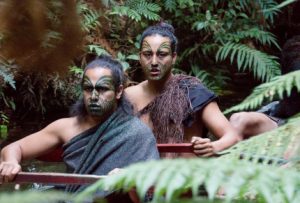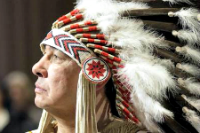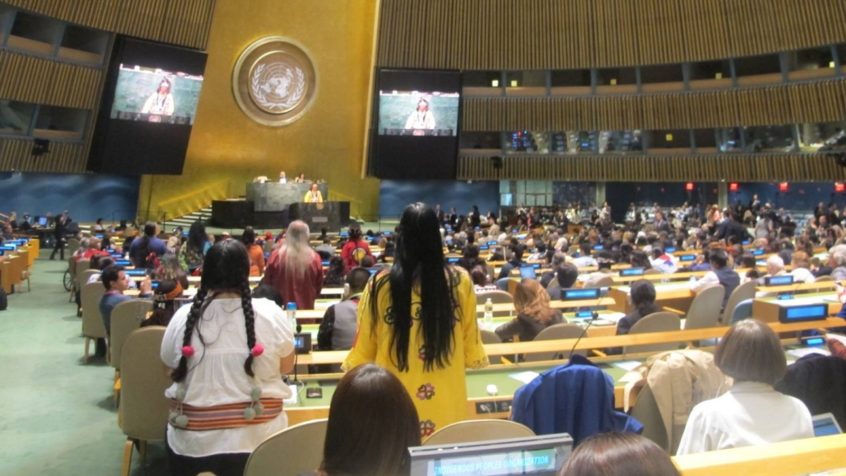Registration is now open!
Session 1: Monday 11th (US) / Tuesday 12th January (Australia/Pacific) – click here to register
Session 2: Wednesday 13th (US) / Thursday 14th January (Australia/Pacific) – click here to register
Times:
January 11/13: 8 – 10 PM US (EST) / 3 – 5 PM Hawai’i
January 12/14: 9 – 11 AM Perth (AWST) / 12 – 2 PM Sydney (AEST) / 2 – 4 PM New Zealand
Background
In 2020, the Permanent Forum on Indigenous Issues postponed its 19th session due to the COVID-19 pandemic. The Economic and Social Council decided that the 20th session of the Permanent Forum will take place from 19-30 April 2021 on the theme of “Peace, justice and effective institutions: the role of indigenous peoples in the fulfillment of Sustainable Development Goal 16″.
Introduction
In preparation for the 2021 session, the Permanent Forum will conduct informal virtual dialogues with indigenous peoples and Member State representatives. United Nations agencies, funds and programmes, regional and national human rights institutions, NGOs in consultative status with ECOSOC, and academia are also invited to participate.
Dr. Hannah McGlade, member of the Permanent Forum from the Pacific, will lead the virtual dialogue, with the assistance of Geoffrey Roth, PFII member from the United States of America.
Hannah is a Noongar human rights and social justice advocate from Western Australia. She has worked for many indigenous organizations and bodies and has been active in establishing services for indigenous women and children impacted by violence. A former Senior Indigenous Fellow at the Office of the United Nations High Commissioner for Human Rights, Dr. McGlade has participated in many United Nations fora to promote indigenous human rights in Australia.
Objectives
- Provide a mechanism for a regional dialogue between indigenous peoples, Member States, and the United Nations system with the members of the Permanent Forum regarding the human rights of indigenous peoples;
- Identify specific strategic measures to promote the implementation of the United Nations Declaration on the Rights of Indigenous Peoples, and ILO Convention No. 169 on indigenous and tribal peoples;
- Identify possible themes for a regional dialogue during the PFII 2021 session.
Sessions, Themes and Panellists
The following four topics will be discussed over two days/four sessions. For a complete list of related resources, please scroll below under “Resources”.
Tuesday January 12, 9 AM – 11 AM (Australian Western Standard Time)
- Violence against women and children
- Introductory remarks: Dr. Najat Maalla M’jid, Special Representative of the UN Secretary-General on Violence Against Children
- Marcia Kalinoe, Executive Director, Family and Sexual Violence Action Committee, Papua New Guinea
- Dame Naida Glavich, Chair, National Iwi Chairs Forum Governance Group
- Enid Barlong Kantha, Programme Specialist, International Organization for Migration, Papua New Guinea
- Marlene Longbottom, Postdoctoral Research Fellow, Australian Health Services Research Institute University of Wollongong, Australia
- Incarceration and deaths in custody
- Hinewirangi Kohu Morgan, Psychotherapist, Waikeria Prison, New Zealand
- Tony McAvoy SC, Barrister, Frederick Jordan Chambers, NSW, Australia
- Tracey McIntosh, Professor, School of Māori Studies and Pacific Studies, University of Auckland, New Zealand
- Ciara Lacy, Director-Producer, Hawai’i
Presentations from Tuesday’s session
Thursday January 14, 9 AM -11 AM (Australian Western Standard Time)
- Self-determination and self-governance
- Margaret Mutu, Professor of Māori Studies, University of Auckland, New Zealand
- Lisa Natividad, Associate Professor of Social Work, University of Guam and President, Guahan Coalition for Peace and Justice
- Leviante Araki, President, Rapa Nui Parliament
- Cathy Eatock, Co-Chair, Indigenous Peoples’ Organization-Australia and PhD Candidate, University of Sydney
- Climate change and land issues
- UN Special Representative on the Right to Development, Mr. Saad Alfarargi (video message)
- Jane Au, Director, Aina Momona, Hawai’i
- Mike Smith, Iwi Chairs Forum Climate Change Leaders Group, New Zealand
- Sasha Purcell, Human Rights lawyer, Torres Strait Islander climate change expert
- Kado Muir, Traditional Owner, Anthropologist and Deputy Chair, National Native Title Council, Australia
Presentations from Thursday’s session
- Statement by UN Special Representative on the Right to Development, Mr. Saad Alfarargi
- Margaret Mutu
- Lisa Natividad
- Jane Au
- Cathy Eatock
Guiding Questions
- What are the priority issues affecting indigenous peoples?
- What are the key causes of these issues (are they apparent/well understood, structural/ more systemic, or a mix of both)?
- What urgent action is needed to help resolve these issues?
- What concrete and specific recommendations would you propose – in particular to the PFII and United Nations system, Member States, the private sector, indigenous peoples’ organizations or other stakeholders?
The Permanent Forum
The United Nations Permanent Forum on Indigenous Issues (UNPFII) is a high- level advisory body to the Economic and Social Council. The Forum was established on 28 July 2000 by resolution 2000/22, with the mandate to deal with indigenous issues related to economic and social development, culture, the environment, education, health and human rights.
More specifically, the Permanent Forum:
- Provides expert advice and recommendations on indigenous issues to the Council, as well as to programmes, funds and agencies of the United Nations, through ECOSOC;
- Raises awareness and promotes the integration and coordination of activities related to indigenous issues within the UN system;
- Prepares and disseminates information on indigenous issues;
- Promotes respect for and full application of the provisions of the UN Declaration on the Rights of Indigenous Peoples and follows up on the effectiveness of this Declaration (Art. 42 UNDRIP).
In addition to the six mandated areas (economic and social development, culture, the environment, education, health and human rights), each session is thematically focused on a specific issue. The Permanent Forum is one of three UN bodies that is mandated to deal specifically with indigenous peoples’ issues. The others are the Expert Mechanism on the Rights of Indigenous Peoples and the Special Rapporteur on the rights of indigenous peoples.
Resources
- “Study on indigenous peoples’ autonomies: experiences and perspectives”, UNPFII member Jens Dahl (2020)
- “Study on the relationship between indigenous peoples and the Pacific Ocean, taking into account issues of governance, the effects of climate change, deep sea mining, resources and sustainable development”, UNPFII member Valmaine Toki (2016)
- “The Indigenous World 2020” , International Work Group for Indigenous Affairs (2020)
- UN Study on the extent of violence against indigenous women and girls in terms of article 22 (2) of the United Nations Declaration on the Rights of Indigenous Peoples
- International expert group meeting on combating violence against indigenous women and girls: article 22 of the United Nations Declaration on the Rights of Indigenous Peoples
- International Expert Group Meeting on Indigenous Children and Youth in Detention, Custody, Foster-Care and Adoption
- Study on indigenous peoples’ autonomies: experiences and perspectives
- Study on how States exploit weak procedural rules in international organizations to devalue the United Nations Declaration on the Rights of Indigenous Peoples and other international human rights law
- Study on decolonization of the Pacific region
- Study on the relationship between indigenous peoples and the Pacific Ocean
- Report on indigenous fishing rights in the seas with case studies from Australia and Norway
- Study on the extent to which climate change policies and projects adhere to the standards set forth in the United Nations Declaration on the Rights of Indigenous Peoples
- Impact of Climate Change Mitigation Measures on Indigenous Peoples and on Their Territories and Lands
- Expert Group Meeting on Climate Change
Outreach and Social Media
For all UN outreach and social media materials related to indigenous peoples, visit our Trello board here: http://bit.ly/1W8YMB5
- Twitter: https://twitter.com/UN4Indigenous
- Facebook: https://www.facebook.com/unpfii/
- Instagram: https://www.instagram.com/UN4Indigenous



